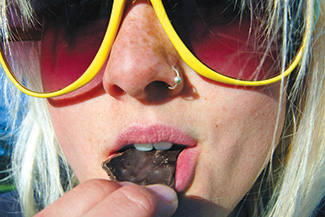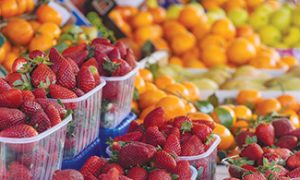 Basking here in the dog days of summer, we all know that sunscreen is the No. 1 way to prevent skin cancer. But there are some surprising dietary tactics — including eating foods, like chocolate, that are rich in antioxidants — that can help reduce risk, too.
Basking here in the dog days of summer, we all know that sunscreen is the No. 1 way to prevent skin cancer. But there are some surprising dietary tactics — including eating foods, like chocolate, that are rich in antioxidants — that can help reduce risk, too.
Sun protection in the form of hats and sunscreen isn’t the only way to prevent skin cancer. It turns out that what you eat may help mitigate the damaging effects of the sun’s ultraviolet (UV) radiation, (the major risk factor for skin cancer), too. Among the foods that might help:
CHOCOLATE
Chocolate boasts lots of healthy antioxidants in the form of phenols and catechins. Cocoa, or dark chocolate, contains four times as much phenols and catechins as tea — antioxidants that protect our skin from sunburn and skin cancer. Experts recommend adding two ounces of dark chocolate to your daily diet. Antioxidants disarm free radicals, DNA-damaging molecules formed when UV rays penetrate skin, according to the National Cancer Institute. Rich in vitamins A, B1, C, D and E, plus iron and calcium, chocolate nourishes your skin from the inside out to replace lost moisture, and it prevents ageing thanks to its antioxidant flavonoids.
TOMATOES
Tomatoes, red peppers and other bright red produce contain the skin-friendly antioxidant lycopene. Some research has shown that lycopene can protect skin from the damaging effects of UV rays. This may not only help shield you from skin cancer, but it also helps stop the breakdown of tissues that may lead to wrinkles. When choosing vegetables, look for the brightest red variety, which is also the most abundant in lycopene. And, when possible, cook them; heat helps release lycopene from plant cells so your body can better absorb it.
GARLIC
Garlic contains several antioxidants, including compounds that have been shown to inhibit the growth of basal cell carcinoma and melanoma cells. Among its health promoting ingredients are sulfur-containing compounds (allicin), flavonoids, selenium and arginine. Research published in the journal Nutrition and Cancer suggest that daily garlic intake reduces the risk of skin cancer.
GREEN TEA
Green tea’s skin-protective powers come from the anti-inflammatory effects of phytochemicals of phenols. In a study published in the Journal of the American Academy of Dermatology, people who regularly consumed two cups of green tea daily had a significantly lower risk of squamous cell skin carcinoma (the second most common form of skin cancer).
Some of your favorite orange foods are packed with beta-carotene, an antioxidant that converts to vitamin A in the body. Vitamin A boosts your immune system’s ability to fight some cancers, according to The Skin Cancer Foundation. In a 2019 study published in JAMA Dermatology, researchers found that participants whose diet had the highest intake of vitamin A had a 17 percent reduction in their risk of developing squamous cell carcinoma.
OMEGA-3 FATTY ACIDS
Omega-3 fatty acids are another nutrient believed to play a role in preventing skin cancer progression, according to the Skin Cancer Foundation. High concentrations of omega-3 polyunsaturated fatty acids in the cell membrane work to maintain cells against UV damage, reported a study published in the American Journal of Clinical Nutrition. Fatty fish such as salmon and sardines are a great source of omega-3’s. Vegetarian? Not to worry; walnuts and chia seeds also offer similar benefits.
Follow a cancer-fighting diet
 A healthy diet can help you prevent or fight cancer.
A healthy diet can help you prevent or fight cancer.
Some cancer risk factors, such as genetics and environment, are out of your control, but research suggests that about 70 percent of your lifetime risk of cancer is within your power to change, including your diet. Avoiding cigarettes, limiting alcohol, reaching a healthy weight, and getting regular exercise all are great steps for preventing cancer. Adopting a healthy diet can also play a vital role.
What you eat — and don’t eat — can have a powerful effect on your health, including your risk for cancer. While research tends to point to associations between specific foods and cancer, rather than solid cause-and-effect relationships, there are certain dietary habits that can have a major influence on your risk.
If you have a history of cancer in your family, making small changes to your diet and behaviors now can make a big difference to your long-term health. And if you’ve already been diagnosed with cancer, eating a nutritious diet can help support your mood and strengthen your body during this challenging time.
A PREVENTIVE DIET
To lower your risk for many types of cancer and serious disease aim to build your diet around a variety of antioxidant-rich fruit and vegetables, nuts, beans, whole grains and healthy fats. Try to limit the amount of processed and fried foods, unhealthy fats, sugars and refined carbs you consume.
Plant-based foods are rich in nutrients known as antioxidants that boost your immune system and help protect against cancer cells.
Most of us fall well short of the recommended daily minimum of five servings of fruit and vegetables. To add more to your diet, focus on adding “whole” foods, as close to their natural state as possible.
Fiber found in fruit, vegetables, and whole grains plays a key role in keeping your digestive system clean and healthy. It helps keep cancer-causing compounds moving through your digestive tract before they can create harm. Eating a diet high in fiber may help prevent colorectal cancer and other common digestive system cancers, including stomach, mouth, and pharynx.


